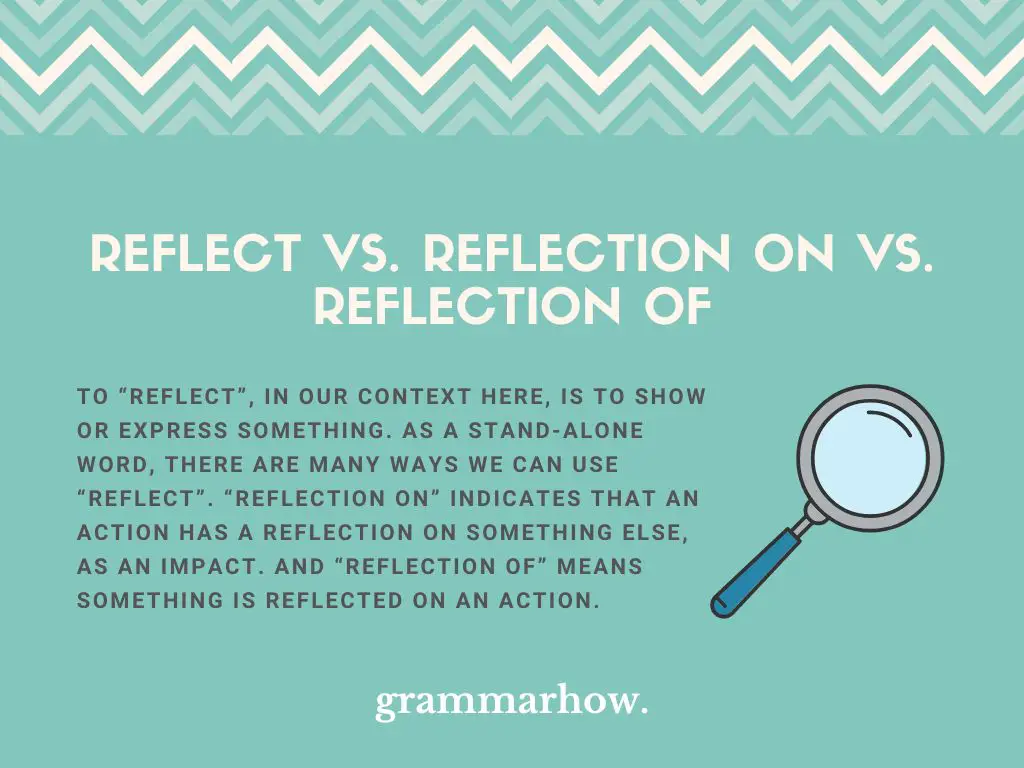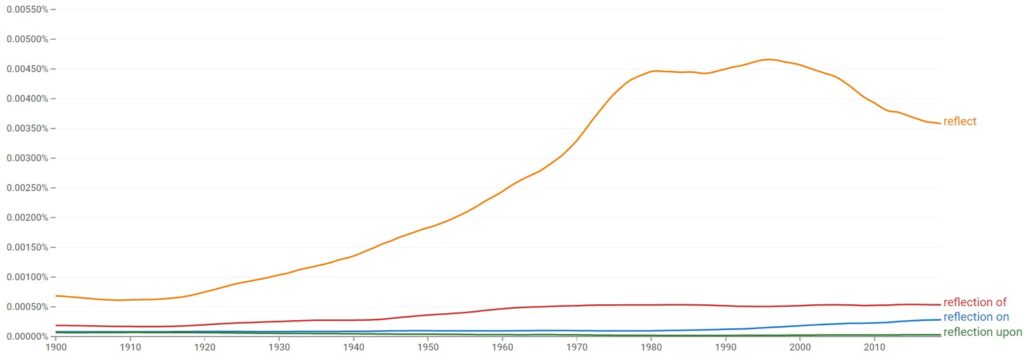Prepositions can make a big difference in the message a phrase or sentence conveys. The same word, followed by different prepositions can convey a different meaning.
Look at those forms: “Reflect”, “Reflection On” and “Reflection Of”. Do they mean the same? Is any incorrect? How to use them? Let’s see!
Reflect vs. Reflection On vs. Reflection Of
To “Reflect”, in our context here, is to show or express something. As a stand-alone word, there are many ways we can use “Reflect”. “Reflection On” indicates that an action has a reflection on something else, as an impact. And “Reflection Of” means something is reflected on an action.

I can assure you it’s much less complicated than it sounds. Let’s begin with some examples, and afterward, we’ll go over each word or phrase separately.
Here we go:
- Georgina’s outfits reflect her great fashion taste.
- Georgina’s outfits are a reflection on her great fashion taste. (incorrect)
- Georgina’s outfits are a reflection of her great fashion taste.
Each sentence in the examples contains the same message, using all three phrases. The first sentence, simply put, says that the fact a lady is well dressed “Reflects” her good taste. In other words, we can infer that she has good taste from the way she dresses daily.
The second sentence replaces “Reflect” for “Reflection On”. This form is incorrect because it should be the other way around: Georgina’s fashion taste is what has an impact on how she dresses.
The third sentence replaces “Reflection On” for “Reflection Of”, and makes perfect sense. This form is grammatically correct and acceptable.
Keep in mind that there are many instances in which “Reflection On” makes sense. Those would be when the subject’s actions are what cause an impact on something else. Let’s go over each phrase separately to better understand them.
Reflect
“Reflect” is a word that can have many meanings. It can indicate the physical reflection of light, sound, or heat, for example. It can be the expression, show, or sign of something, as a representation. Or it can describe thinking carefully about your options and opinions. Those are all correct.
Let’s take a look at some helpful examples:
- Anna took a moment on her day to reflect.
- Everyone should take some time to reflect.
- Do you feel like this painting accurately reflects who you are?
- A democratic government must reflect the beliefs of its people.
- Meditation is helpful to reflect.
- The windows reflected the light, and it seemed the house was sparkling.
The sentences show many different ways the word “Reflect” can be used. All of them are correct.
For our purposes here, we’re focusing on the idea of reflecting one thing on another and its implications. Let’s take a look at what “Reflection On” means.
Reflection On
“Reflection On” has two meanings. It can indicate the action of taking time to think about, or elaborate, on something that has happened or that needs to be reconsidered or reevaluated. Also, it means that one thing (or action) has an impact on another, as a ripple effect.
Take a look at the examples, that show both meanings:
- Joel led the group in a reflection on the meeting, before writing the report.
- I hope Jimmy is aware that his bad behavior has a reflection on his reputation.
- Conrad’s social work has a reflection on his father, who’s always proud of him.
- The class’s low grades have a reflection on the teacher as well.
- How the customer service representatives behaved caused a bad reflection on the team leader.
When one action has a “Reflection On” something else, the result or consequence isn’t always positive. Using this expression is a common way to state that a bad outcome came as a result of the original action taken.
You’ll see that clearly in sentences 3, 4, and 5. Keep that in mind, when using this expression.
Reflection Of
“Reflection Of” indicates that the action or event that’s taking place is a consequence or direct result of someone else’s actions or behaviors, before that moment in time. In this case, the reflection is on the current actions, like a light shining upon it, not the other way around.
Here are some helpful examples:
- Your school grades are not a reflection of you as a person.
- His coldness toward those who loved him is a reflection of his nature.
- Ann and Joe’s demeanor was a reflection of their parent’s healthy upbringing.
- The team’s ability to handle the crisis with such poise was a reflection of Gina’s leadership.
- What Carl does is not a reflection of you, Martha.
Reflection Upon
“Reflection Upon” means thinking carefully about something. It can complement “Reflect” when it’s used by itself. And it can also be a synonym for “Reflection On”.
Take a look at some examples:
- Your actions, good or bad, have a reflection upon the company.
- Your grades and behavior cause a reflection upon the school.
- Upon reflection, Sarah realized she’d been wrong for a long time.
- Your looks don’t have a reflection upon how people see you as a person.
- Peter changed his mind after taking time to reflect upon his feelings.
Which Is Used the Most?
Which one of those forms is used more often, “Reflect”, “Reflection On”, “Reflection Of” or “Reflection Upon”? Let’s take a look at the graph from Google Ngram Viewer below.

“Reflect” as a stand-alone word appears much more frequently than all the other phrases. This was expected because “Reflect” can be complemented in many ways and convey many different meanings. It’s a word with broad use.
“Reflection Of”, “Reflection On” and “Reflection Upon” (in that particular order) follow “Reflect” from a distance. As set phrases with very specific meanings, it’s natural that they aren’t used as often.
Also, keep in mind that “Reflection Upon” is a bit more complicated than “Reflection On”, despite having the same meaning. It’s expected that the more complicated form isn’t used as much.
Final Thoughts
“Reflect”, “Reflection On” and “Reflection Of” are all correct but have different applications. “Reflect” is about having an impact, literal or figurative. “Reflection On” indicates an action has an impact on something or someone (usually bad). “Reflection Of” indicates that an action is a consequence of something done before.

Martin holds a Master’s degree in Finance and International Business. He has six years of experience in professional communication with clients, executives, and colleagues. Furthermore, he has teaching experience from Aarhus University. Martin has been featured as an expert in communication and teaching on Forbes and Shopify. Read more about Martin here.
